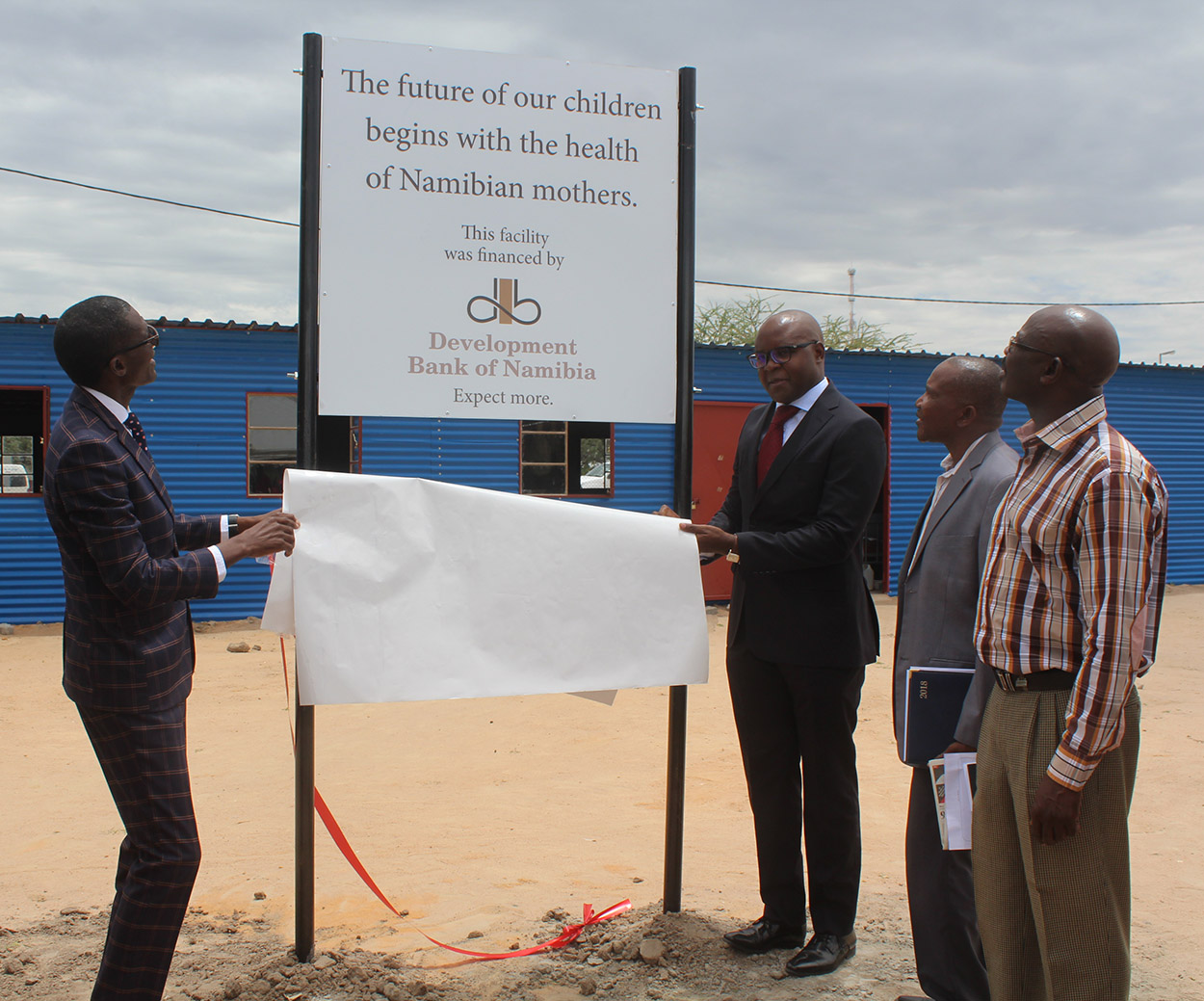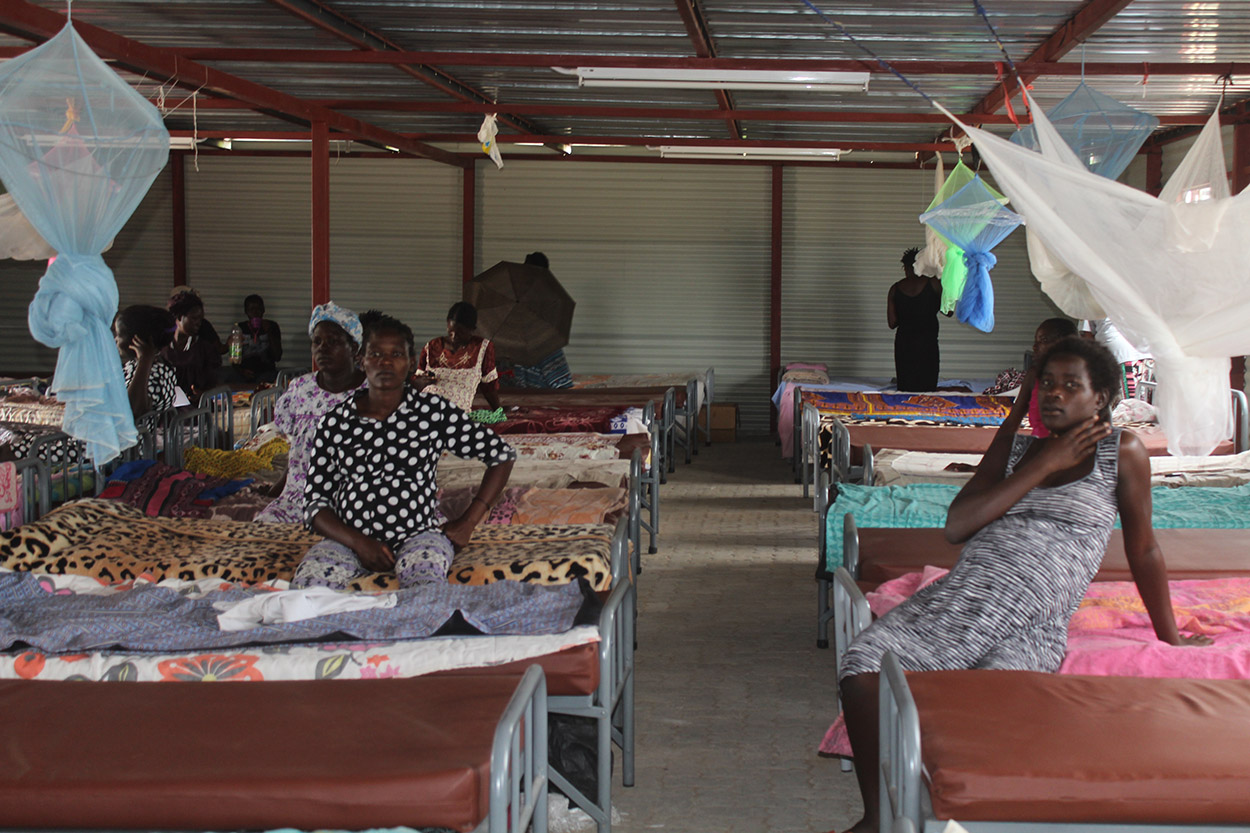
CSI (6)
Development Bank of Namibia donates for the construction of a fish dam Tilapia farming and orchard irrigation for northern women’s co-operative
Development Bank of Namibia (DBN) CEO Martin Inkumbi recently donated on behalf of the Bank N$150,000 for construction of a dam for the Tegako 2020 Women in Business Co-operative. Tegako will use the dam for tilapia farming, as well as for irrigation of an orchard of 500 trees and vegetable plots.
Tegako 2020 Women in Business Co-operative is a group of visionary women from Olulongo in the Oshana Region. The Co-operative, which benefits widows, pensioners, orphans, those living with HIV and aids and others, engages primarily in traditional income generating activities, of which tilapia aquaculture is one.
Martin Inkumbi said, the Bank elected to finance the dam as DBN sees it as having good potential to uplift the livelihood of this group of rural women, their families and the surrounding community.
He said that the dam will provide food security to members of the Tegako Co-operative, and hoped that tilapia catches would be productive enough to also provide an income to Tegako, and make the Co-operative self-sustaining.
Inkumbi also linked Tegako to sustainable agricultural practices. He said that agricultural industry is vital to reduce rural poverty. Rural poverty leads to urban migration, which in turn leads to urban poverty. By promoting prosperity in rural areas and smaller centers the Bank strives to balance socio-economic wellbeing across the regions of Namibia.
Talking about the significance of dams, Inkumbi said that water storage represents a current resource for the economy but is also critical for providing a buffer against drought. The further value of dams lies in catering to the water requirements of future generations. In light of this, Inkumbi said, the Bank makes available finance for water storage infrastructure, such as dams and reservoirs, as well as water distribution infrastructure.
Noting that the Co-operative was established and is managed by women, he said DBN seeks to transform economic participation in favour of women. The Bank is well aware of the critical role of women in providing for their families and the benefits they bring to communities.
The Bank recognises that by providing finance for women entrepreneurs, it will strengthen their opportunities to spread the benefits of their incomes and give them the ability to create opportunities for other Namibians.
Inkumbi concluded by noting that the project fulfils four of the Bank’s six pillars of corporate social investment. The project, he said provides an exemplary means of poverty alleviation but also skills development, community health and environmental benefits. The Bank also provides funding for educational initiatives and improvement of the broader business environment.
Development Bank provides shelter for Outapi mothers
CEO Martin Inkumbi pledges DBN support and respect for the women of Namibia
The Development Bank of Namibia (DBN) has provided accommodation facilities for expecting mothers visiting Outapi State Hospital in the Omusati Region. Valued at more than N$300,000, the facility alleviates the need for shelter for women who cannot afford accommodation when visiting the hospital for prenatal health services and care. Previously, some women seeking prenatal care slept in tents or on the ground, under trees.
 |
 |
Handing over the facility to the hospital, Inkumbi said that Namibia’s future is built on mothers and their care for their children and families. The Bank recognizes that maternal health is a pillar on which the future relies. To this end, the Bank made the donation to construct the facility.
Inkumbi went on to say, DBN also supports needy communicates through its CSI intervention, albeit under limited budget. The Bank’s CSI Policy has multiple targets, defined by specific fields in which the Bank seeks to make targeted interventions. These are poverty alleviation, development of education, skills development, care for the environment, community health, and activities that materially improve the business environment.
Firstly, Inkumbi said, the Bank encourages economic participation on the part of women. The Bank encourages women-led enterprises through its drive to transform the economy with finance. He added that the Bank measures approval of finance for women, and uses its figures as a benchmark for its effect. He encouraged women entrepreneurs and women-led enterprises to approach DBN with their business plans.
Secondly, Inkumbi said, the Bank treats women on its payroll equally, and with respect. As a matter of fact, women are more than men in the Bank and he added that more than half of DBN’s senior management team are women.
Thirdly, Inkumbi said, the Bank supports women through its CSI Policy, of which the Outapi facility is an example.
Inkumbi concluded by saying that women play an invaluable role in all facets of life in Namibia, and that the Bank should be seen as an enabling agency for their socio-economic development.
Three years to make a difference for the disabled DBN Senior Communication Manager Jerome Mutumba on DBN’s support for Cheshire Homes in Katima Mulilo
Development Bank of Namibia (DBN) Senior Communications Manager Jerome Mutumba has announced significant funding for the Cheshire Home in Katima Mulilo. The center provides shelter for children and youths living with disabilities.
In terms of the agreement with the Cheshire Home, DBN will provide N$250,000 annually for three years. The total of N$750,000 will be dedicated to upgrading facilities at the center. The first tranche of N$250,000 is earmarked for provision of solar power.
Talking about the donation, Mutumba says, although the amount appears substantial, it is a drop in an ocean of need. The residents of the Cheshire Home in Katima Mulilo, are some of the most vulnerable in Namibia, and come from poverty-stricken environments that made it impossible to give them adequate food, clothing, shelter and education.
Mutumba goes on to challenge other enterprises to assist the home with other needs that exist, and may arise. He invites DBN borrowers and other potential donors to call his office for contact details. By giving together, he says, all can make a difference.
On the topic of DBN’s social responsibility, Mutumba says that although the Bank provides commercial lending for developmentally beneficial projects, it provides support to entities that cannot qualify for loans, by virtue of non-profit status, through its corporate social investment programme.
He explains that, with the agreement of the Bank’s shareholder, Minister of Finance, Hon. Calle Schlettwein, representing the Ministry of Finance and the Government, the Bank sets aside a portion of its profit for the dual purposes of corporate social investment and the Bank’s Project Preparation Fund.
The Bank’s Corporate Social Investment Policy has multiple targets, defined by specific fields in which the Bank seeks to make targeted interventions. These are poverty alleviation, development of education, skills development, care for the environment, community health, and activities that materially improve the business environment.
He notes that the Cheshire Home in Katima Mulilo satisfy multiple targets of the Bank’s social investment policy, including health, education, skills development and poverty alleviation. He concludes by saying that the Bank regards the center as a signature project of its social responsibility.
Seed capital for Hope Village vegetable growing Development Bank of Namibia funds two Veggietunnels
The Development Bank of Namibia (DBN) has made a donation of N$50,000 to Hope Village in Greenwell Matongo, Windhoek. The amount will be used to erect two Veggietunnels to cultivate vegetables, irrigation for the tunnels and supplies to establish cultivation in the tunnels.
Speaking about the donation, DBN CEO Martin Inkumbi said not all projects are able to benefit from the commercial approach that the Bank takes. To support projects of that do not qualify for traditional loans, the Bank sets aside a portion of its profits for corporate social investment.
The Hope Village Veggietunnels are what the Bank considers an excellent investment. Although DBN will not measure it in terms of financial returns, the Veggietunnels will create significant benefits for the children of Hope Village, the community of Greenwell Matongo and the future of Namibia.
By growing its own food, Hope Village will reduce its requirement for financing from external sources, and will be able to have greater security by providing sound nutrition for its family in a sustainable manner. Teaching children how to grow their own food, he added, makes them sustainable in later life. With the knowledge that food can be grown at home, the Bank hopes that they can become future producers for themselves, for their families, friends and communities.
Hope Village says that, in addition to food for the children, surplus produce will be sold to the community of Greenwell Matongo, and the project will create employment opportunities.
Inkumbi said a large part of urban Namibians do not have access to agricultural land or the means to produce food, and many lack the skills. Their experience of agriculture is that it is an exchange of cash for bags of fruit and vegetables. If the cash or produce is not available, nutrition is restricted.
He went on to say that DBN has implemented an environmental and social management system that promotes the wellbeing of people and the environment. The donation is informed by the Bank’s concern for both those aspects, now and in the future.
Inkumbi concluded by saying that DBN expects more from the future, and the donation is an expression of that hope.
DBN Release Chairs

Be seated for development. The Development Bank of Namibia (DBN) recently donated 215 chairs to Schlip Primary School in the Hardap Region. The Bank has financed numerous schools at primary and secondary levels. It also provided finance for the International University of Management, IUM. Where possible, the Bank makes social investments in education as well. Speaking at the handover, the Bank’s Public Relations Officer, Di-Anna Grobler said that when the Bank makes donations of this nature, it gives without expectation of repayment, but it expects a return in the improvement of educational outcomes.
Good studying is good for development Development Bank of Namibia donates N$50,000 towards construction of Rundu school hall
The Development Bank of Namibia (DBN) recently donated N$50,000 towards construction of a school hall for Romanus Kamunoko Secondary School in Rundu. The school currently has to rent larger premises when its learners are required to sit for exams.
Talking at the handover, DBN CEO Martin Inkumbi said that he and many of his colleagues attended schools with limited facilities. However with determination to learn, they were able to rise to the challenge of learning, and improve their prospects in life.
Addressing the learners, Inkumbi said that the outcome of diligent study would lead to a higher quality of life in adulthood. He told the learners that although they should set aside some time for relaxation, they should place a high degree of emphasis on their studies.
He added that learning was a partnership between the parent, the teacher and the learner, and that all three should be actively engaged in the education of the learner. He said that parents and carers should take an active interest in the progress of learners, and endeavour to assist if learners fell behind.
Inkumbi concluded by saying that he hoped that some of the learners would join the Bank as valued, knowledgeable employees.
In addition to finance provided for private tertiary, secondary and primary educational facilities, the Bank provides support for public sector schools through its social responsibility programmes, including assistance with upgrading of hostel facilities for one school, and support to a school damaged in flooding in the north.









